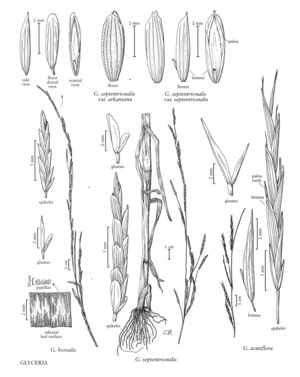familyPoaceae
subfamilyPoaceae subfam. Pooideae
genusGlyceria
sectionGlyceria sect. Glyceria
speciesGlyceria septentrionalis
Glyceria septentrionalis var. arkansana
Synonyms: Glyceria arkansana
Treatment appears in FNA Volume 24. Treatment on page 83.
Revision as of 20:54, 5 November 2020 by imported>Volume Importer
Ligules 5-14 mm; blades 6-12 mm wide. Panicle branches 3-7 cm, with 3-5 spikelets. Rachilla internodes 0.5-1.5 mm. Lemmas hispidulous over the veins, hairs about 0.1 mm, hispidulous, scabrous, or scabridulous between the veins, apices rounded to acute, crenate. 2n = unknown.
Discussion
Glyceria septentrionalis var. arkansana grows in roadside ditches and on the edges of swamps, lakes, and ponds in the flood plain of the Mississippi River, from southern Illinois and Indiana to the Gulf coast. There is also one record from central Tennessee (Chester et al. 1993). The size of its stomates suggests that var. arkansana, like var. septentrionalis, is a tetraploid.
Selected References
None.
Lower Taxa
None.
